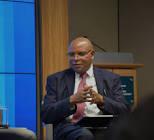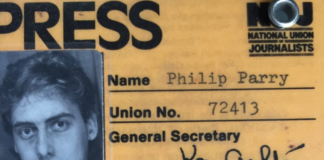- Bombs away! - 28th February 2026
- Massaging the truth - 27th February 2026
- ‘It’s the new economy, stupid…’ - 27th February 2026

During 23 years with the BBC, and in a 41 year journalistic career (when he was trained to use clear and simple language, avoiding jargon) for our Editor, Welshman Phil Parry, it has always been fundamental to expose the weakness in official policy, or when the plans don’t happen AT ALL.
This is now underlined by a conference next month with delegates meeting against a disturbing backdrop of ‘sustainable development goals’ announced 10 years ago to turn “billions to trillions”, which were never actually reached!
Official policy can sound good, but the reality of it is rather different.

For example in the 1980s and 1990s, when the high level of unemployment was a major issue, you used to see loads of similar policy announcements which actually amounted to virtually nothing.
The identical media release would be pushed out at each stage of a minor job creation programme, but it would be reported every time (except by me!), so the cumulative effect in the minds of the voters would be of a LARGE number of new roles being created, and that the government of the day was really turning its financial firepower on the joblessness problem.
 It would be down to other journalists to expose what was really happening.
It would be down to other journalists to expose what was really happening.
This has been thrown into sharp relief for me by a conference in Seville next month on international development, where in the past there have been grand pronouncements.
Previous ones were actually a complete failure, but you are unlikely to hear that from the delegates.
10 years ago world leaders agreed on 17 Sustainable Development Goals (SDGs), ranging from ending global hunger, to ensuring decent work for all.


An ensuing conference in Ethiopia’s capital, Addis Ababa, was meant to work out how to pay for them.
The World Bank (WB) and other multilateral lenders talked of turning “billions to trillions”, because relatively small dollops of public money could spur much larger flows of private capital.
It would mean (supposedly) that the pensions and insurance premiums of the rich would build roads and power plants for the poor.
But this simply hasn’t happened and the Seville conference is likely to be in a glum mood, with public finance for development in crisis.

Almost every big bilateral donor is cutting aid, and government spending is falling in two-thirds of African countries as they grapple with debt.
Private finance has been scared off and billions have not become trillions, however you choose to measure it.
The slogan was “well-meaning but silly”, said Philippe Valahu of the Private Infrastructure Development Group (PIDG), which funds projects in developing countries.
Its silliness is most obvious in Africa, and many countries there are still quite poor.

The familiar cycle of grand promises and modest delivery (or even none at all), is seen by many Africans as “a betrayal of trust”, declared Daouda Sembene, a former presidential adviser in Senegal.
In contrast to turning “billions to trillions”, the reality is that only 17 per cent of SDG targets are even on track to be met by their original end date of 2030.
So be very cautious when politicians or senior officials make grand-sounding statements like these.
They might never happen and could have been said before!

The memories of Phil’s extraordinary decades long award-winning career in journalism (when official policy was often questioned), as he was gripped by the rare neurological disabling condition Hereditary Spastic Paraplegia (HSP), have been released in a major book ‘A Good Story’. Order it now.
Tomorrow – how during that career Phil has always known that economic factors are central, and this is now put centre stage by the new emphasis on ‘tariffs’ today, as well as by the Welsh Government’s policy of supporting the ‘foundational economy’, when broad brush economic plans are the responsibility of the UK Government so these are just tweaks.










